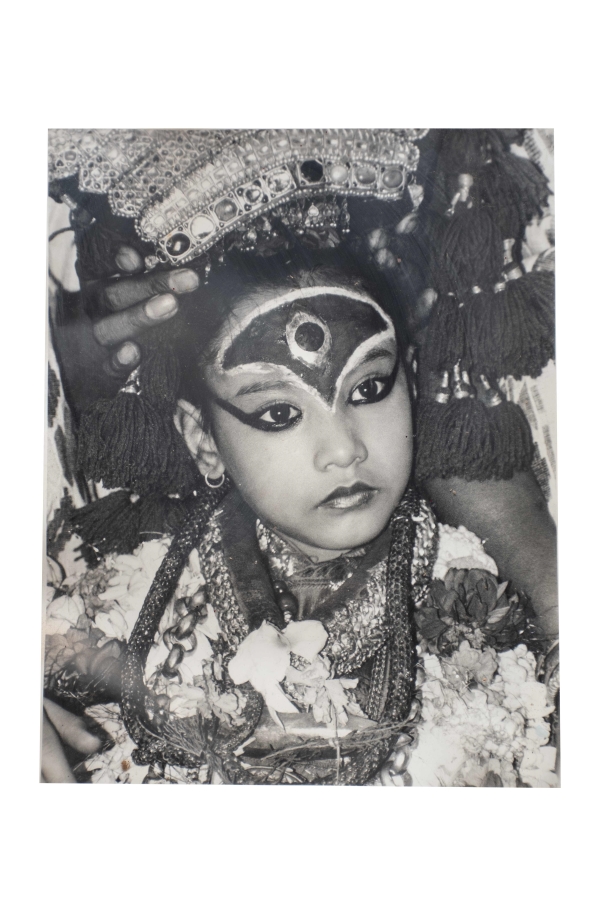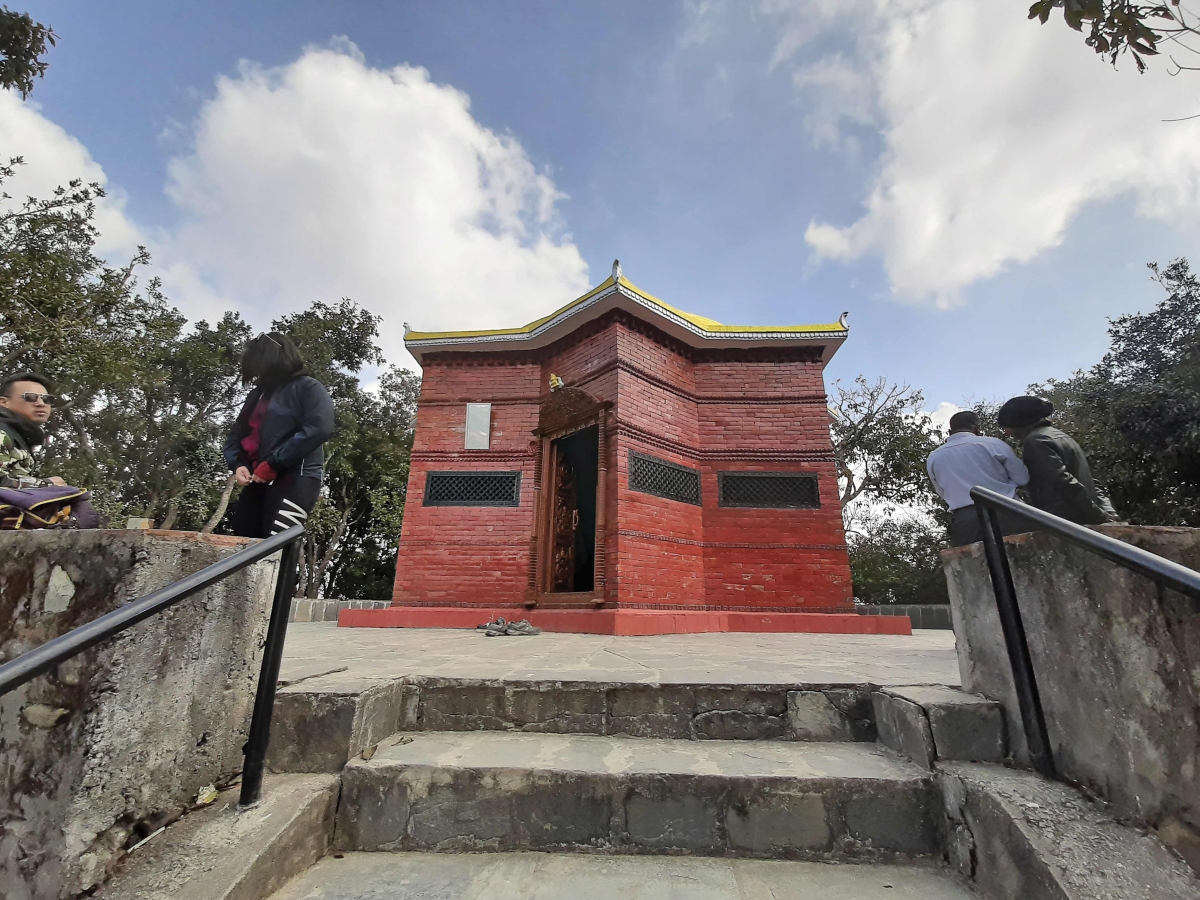“In today’s world, man is very busy, worrying about many things: bills, work, money, love, family, tax, politics and more. Where is there space for God, in all of this? Where, in your mind and in your heart, is there space for him to sit?” - Sri Mahanta Pushpa Das Udasin
Man has always desired to be better than he is, with most of us asking for the assistance of spiritual or divine forces, in our growth. All religions have come up with methods, to bring us closer to God, or the universe. There appears, these days anyway, to be thousands of ways to attain enlightenment.
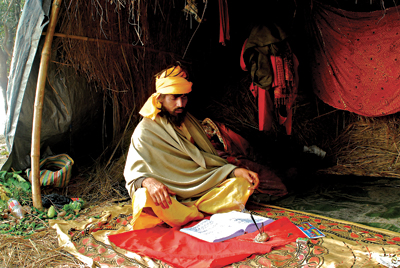 Religions and spiritual groups claim to be able to help using retreats, deep meditations, tantric workshops, college courses, internent courses, yoga workouts, Ayawaska ceremonies and the like. Some even work, helping those who perhaps understand little and think a lot, giving a basic understanding of practices that may never be attained otherwise and providing building blocks for one’s journey.
Religions and spiritual groups claim to be able to help using retreats, deep meditations, tantric workshops, college courses, internent courses, yoga workouts, Ayawaska ceremonies and the like. Some even work, helping those who perhaps understand little and think a lot, giving a basic understanding of practices that may never be attained otherwise and providing building blocks for one’s journey.
I am a Hindu bhakta, a follower and praiser of God’s name(s), though I have studied many paths. More than that, I am a bideshi, a foreigner, and have come into the intricate Hindu world as an outsider. I don’t do Vipassanas or Osho retreats; even though I respect them, my path is more basic.
It is written, in the Hindu scriptures, that enlightenment can be attained through four practices: Bhakta (one whose life is only for the divine), Gyan (wisdom, collection of), Karma (selfless work, consideration for others) and Dhyan (retreating into deep meditation). All four are active in my everyday life, as with most people: collecting and sharing wisdom, reciting God’s name(s), working for others and my Guru-ji, for the community with certain ceremonies, awareness about how my actions affect others’ and meditating upon the universe and its beauty.
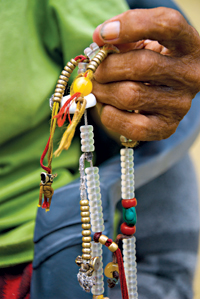 You might now say, yes, yes, I know all this already. But the question is: do you practice it?
You might now say, yes, yes, I know all this already. But the question is: do you practice it?
For this story I will focus on two paths: Bhakta-yoga and Karma-yoga; yoga meaning practice, work.
The Spiritual Retreat
All religions recognise the necessity for man to be at peace, when putting to the task of understanding the divine, to make communication with it, to learn from it.
Some have found that retreating into a cave or a hermitage is best, others believe it is through pilgrimage to holy places, others again through the quest for divine teachers or gurus. For me, it has been journeying. Whether it is climbing to icy, holy lakes, for a masochistic dip, wading through monsoon rains over deep precipices, reciting Lord Shiva’s name over and over, or, moving through inhospitable, mosquito filled jungles looking for great gurus whose names I heard whispered in the winds—I have found travelling as my modus for divine knowledge.
In my early days, I used to feel that I was looking for a great thunderbolt of knowledge, that enlightenment would be attained through some divine syringe, injected deep into my core. But it never really came, at times I became impatient as I searched, even getting upset with myself.
Where’s My Thunderbolt?
“There are only two ways to live your life. One is as though nothing is a miracle. The other is as though everything is a miracle.” -Albert Einstein
For a long time, distracted with finding the thunderbolt, I failed to notice the subtle changes unfolding deep within myself. Daily sadhanas or practices brought subtle changes to my character. These practices include bathing, reciting certain mantras, giving tika, water and gifts to various deities, as well as special tantrik and spiritual items, like certain beads and seeds. At my temple, I have certain rituals I help Guru-ji with, besides regular participation in musical programs or bhajans that praise God.
I used to feel (in the beginning), that these practices were distractions from my quest. But I was wrong, these practices were doing what they intended to: they made me less selfish, more giving, kinder and more understanding of my fellow men, understanding that there are things in life more important than myself. A bhakta’s life is humble, he has nobody and nothing, other than his Guru and God (who are one in the same), and that is all he needs. The divine spirit is always protecting the bhakta, giving all that he requires. Even if the devil meets a bhakta, he will only give his Namaste; even the devil has nothing to take from this simple man.
It is my time with Guru-ji that gives knowledge and wisdom (Gyan) to my quest. But, it has been time spent away from Guru-ji, in the hills and jungles of the world, that has helped me to understand it. Everytime I go outside my “normal” environment, searching, I am put into a calm position of trying to understand what that thunderbolt is. I am put into a position where I can process or discard and organize the questions, thoughts, ideas and confusions of my mind, into a more concise form. I used to feel that sitting with a good guru around his fire on the side of a mountain or in deep jungles, was all I needed to achieve this knowledge. For a long time I failed to realise that the gurus were simply providing me a peaceful location, where I could meditate upon the thunderbolt, and slowly bring it—myself.
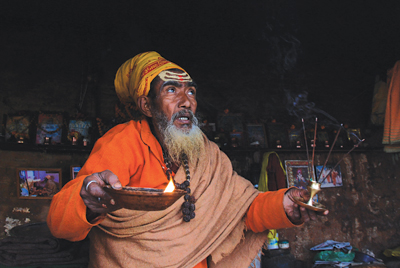 Direct Knowledge
Direct Knowledge
There exists a term called Guru Kripa, simply put, it means receiving knowledge, direct from God. Yes, the Guru also gives knowledge and wisdom, but the universe does too, together they give little pieces of a puzzle, that you put together. A man who retreats, wanders and goes on pilgrimages, puts himself in the position of collecting and processing more pieces of his puzzle, than one who stays put, expecting the knowledge to arrive come to him.
All religions, dharmas and paths recognise the need to go on pilgrimmages: Hindus to Mt. Kailash, Muslims on the Haaj to Mecca, Christians to Mt. Sinai, Buddhists to Lake Manasarovar. It is the practices we do, and hold, on these journeys, on these spiritual retreats, that help us focus our mind on the divine, bringing us closer, even putting us in a position to see the divine’s power in everything we see, every tree, bird, rock and blade of grass around us.
Going on a spiritual retreat, with focus and dedication, is a way for us to let the divine power know that we are searching, that we wish to learn and more importantly—that we are maybe even ready to be gifted with it.
T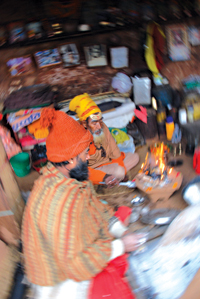 he Karmic-Yogi
he Karmic-Yogi
“Only a life lived for others, is a life worth while.” -Albert Einstein
Most people, in this modern world, working long hours for families and employers find it difficult to do Karma-yoga. Some people believe their station to be too high, their persona too imortant or their work too big, to give time to selfless and simple tasks. Karma-yoga means to work selflessly, for others, without the expectation of payment. Doing tasks or chores like sweeping a temple, feeding the hungry, spending time with an elderly neighbor - works that benefit others, more than oneself. This is one of the ultimate ways of attaining peace in life and even enlightenment. Karma-yoga provides a way to smash the ego, enlightenment’s biggest barrier, putting us in a position to be humble, kind, charitable and giving. These are not just the ideals of Hinduism, but of all walks of life.
Karma-yoga is a path, open to all. One’s personal education, wealth or power, means nothing here. It is about humility and one’s willingness to work, for the greater good, to do for doing’s sake, expecting no reward. With karma-yoga, all men are equal; it does not matter if you are illiterate, and have never read the Sutras, the Koran, or the Holy Bible or if you are educated with Ph.Ds in philosophy, religion and antropology. Under Karma-yoga’s broomstick, the barriers of man’s own self: pride, selfishness and greed, are smashed open, to the road of enlightenment.
Attaining divine knowlege, enlightenment, or, God’s grace, can only come after you surrender yourself to it first—completely. A bit like the movie The Karate Kid, when the young boy thinks himself too good to wax his guru’s car or use a broomstick, but within these practices come the moves, the knowledge and the power that he seeks.
Practicing Karma-yoga, serves not just one’s self and the community, but all of mankind, restoring to some degree, the negative disbalance that exists in the world. A Karma-yogi, and the yogi of any path, is an instrument in maintaining the spiritual balance of life.
Epilogue
The world is a beautiful place, often times difficult, but within each difficulty and joy is a valuable lesson. Take some time to retreat into its wonder, it can be a hilltop, or a quiet spot in your home in the dead of night. If you understand nothing, go on a Vippassana or Osho retreat, or find a simple and kind Guru, who can teach you a few simple practices. Who knows, maybe the universe has a few secrets to teach you too.
Guru-mantra (Translation from Autobiography of a Sadhu—Rampuri)
guru devo maheshwara
guruh sakshat parambrahma Guru is supreme knowledge manifest.
tasmi shri gurave namah! I offer my salutations to that guru.
dhyana mulam gurormurtih The root of meditation is the body of guru.
pujamulam guroh padam The root of puja is the feet of the guru.
mantramulam gurorvakyam The root of mantra is the speech of the guru, and
mokshamulam guroh kripa The root of Liberation is the guru’s grace.
Charlie Das Udasin tries to be a simple man, with simple aims. He thanks the universe and all its Gurus. He can be contacted at charliedasudasin@gmail.com



